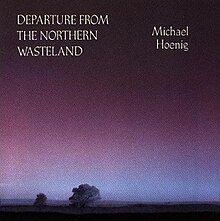
"What's the Frequency, Kenneth?" is a song by American alternative rock band R.E.M. from their ninth studio album, Monster (1994). The song's title refers to an incident in New York City in 1986 in which two then-unknown assailants attacked journalist Dan Rather while repeating "Kenneth, what is the frequency?"
Michael Hoenig is a German composer who has composed music for several films and games, in addition to two solo albums, including the highly acclaimed 1978 album Departure from the Northern Wasteland. In 1997, he was nominated for a Primetime Emmy Award for Outstanding Main Title Theme Music for composing the theme to the science fiction series Dark Skies.
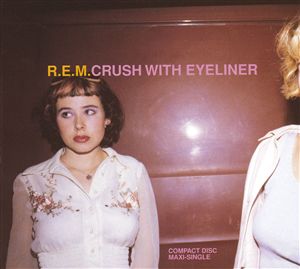
"Crush with Eyeliner" is a song by American rock band R.E.M., released by Warner Bros. Records as the fourth single from their ninth studio album, Monster (1994). Sonic Youth's Thurston Moore provides background vocals. Michael Stipe claims the song was inspired by the band New York Dolls, who, in his opinion, "knew how to exaggerate a song, to make it sound really sleazy and over the top." This was also one of the first songs that surfaced from Stipe after the writer's block that hounded him after the death of his friend, actor River Phoenix.

"Bang and Blame" is a song by American alternative rock group R.E.M. It was released as the second single from their ninth studio album, Monster (1994), on October 31, 1994 by Warner Bros. Records. The song was R.E.M.'s last to reach the top 40 on the US Billboard Hot 100, peaking at number 19, and was also their last number-one single on the Billboard Modern Rock Tracks chart. The single reached number one in Canada—R.E.M.'s only single to do so—and peaked inside the top 40 on the charts of Australia, Belgium, Finland, Iceland, Ireland, the Netherlands, New Zealand, and the United Kingdom.

"Strange Currencies" is a song by American rock band R.E.M. It was included on their ninth studio album, Monster (1994), and was released as the album's third single on April 18, 1995, by Warner Bros. Records. The song reached number nine on the UK Singles Chart and peaked at number 47 in the United States. Like "Everybody Hurts" on R.E.M.'s previous album, it has a time signature of 6
8. The song's music video was directed by Mark Romanek.

"Tongue" is a song by American rock band R.E.M., released on July 17, 1995 by Warner Bros. Records, as the fifth and final single from their ninth studio album, Monster (1994). The song was only released in the US, UK, and Ireland. In the song, lead singer Michael Stipe performs in falsetto; he has stated on several occasions that the narrator of the song is female. Stipe has also said the track is "all about cunnilingus".

"The Sidewinder Sleeps Tonite" is a song by American alternative rock band R.E.M. It was influenced by the song "The Lion Sleeps Tonight", both in the title of the song and through the song's opening refrain. The band used "The Lion Sleeps Tonight" as the B-side to this song in the U.S. The song was released on R.E.M.'s 1992 album, Automatic for the People, and was later released as a single in February 1993, reaching number one in Iceland, number 13 in Ireland, number 17 in the United Kingdom, and number 29 in New Zealand.
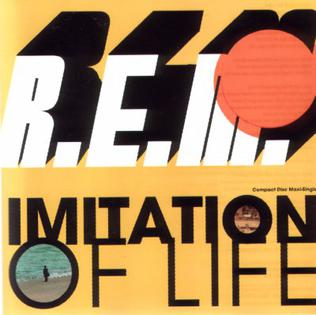
"Imitation of Life" is a song by American alternative rock band R.E.M. It was written by band members Peter Buck, Mike Mills, and Michael Stipe and produced by the band with Pat McCarthy for their 12th studio album, Reveal (2001). The track's title comes from Douglas Sirk's 1959 film of the same name and is used as a metaphor for adolescence and adulthood. One of R.E.M.'s most pop-influenced tracks, "Imitation of Life" has been described lyrically as "see[ing] through the puffed-up performance of a hopeful entertainer", as well as the enjoyment of love.
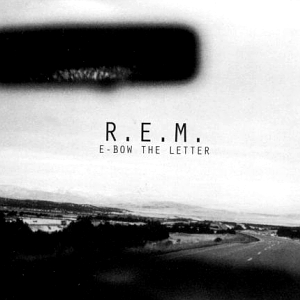
"E-Bow the Letter" is the first single from American rock band R.E.M.'s 10th studio album, New Adventures in Hi-Fi (1996). It was released on August 19, 1996, several weeks before the album's release. During the same month, R.E.M. signed a then record-breaking five-album contract with Warner Bros. Records. The song features American singer-songwriter and "Godmother of Punk" Patti Smith performing backing vocals. Smith was cited as a major influence by band members Michael Stipe and Peter Buck, and she also provided backing vocals for "Blue", the closing track on the band's final studio album, Collapse into Now, in 2011.

"Find the River" is a song by American rock band R.E.M., released on November 29, 1993 by Warner Bros., as the sixth and final single from the band's eighth album, Automatic for the People (1992). The song reached number 54 on the UK Singles Charts in December 1993. It did not chart in the US. "Find the River" was one of only three R.E.M. singles released in the 1990s to not make the Top 40 in Britain. The song's music video was directed by Jodi Wille.

"Drive" is a song by American alternative rock band R.E.M. It is the first track on and the lead single from their eighth studio album, Automatic for the People (1992), and was the first song lead singer Michael Stipe wrote on a computer. "Drive" peaked at number 28 on the US Billboard Hot 100, number one on the Billboard Modern Rock Tracks chart, and number two on the Billboard Album Rock Tracks chart. Internationally, "Drive" became R.E.M.'s then-second-biggest hit on the UK Singles Charts, peaking at number 11, and their biggest hit in Norway until "Supernatural Superserious" in 2008, reaching number three. Elsewhere, the song reached the top 10 in Canada, Ireland, New Zealand, and Switzerland.

"All the Way to Reno (You're Gonna Be a Star)" is a song by American rock band R.E.M. It was released on July 23, 2001 as the second single from the band's twelfth studio album, Reveal (2001). The single did not chart on the US Billboard Hot 100, but it did reach number 24 on the UK Singles Chart, number 31 in Italy, and number 34 in Ireland.
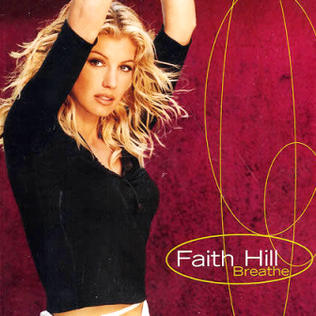
"Breathe" is a song written by Stephanie Bentley and Holly Lamar and recorded by American country music artist Faith Hill. Warner Bros. Records released it on October 4, 1999, as the first single from Hill's fourth album of the same name (1999). The song was produced by Byron Gallimore and Hill. "Breathe" became Hill's seventh number one on the Hot Country Songs chart in the United States, spending six weeks at number one. It also peaked at number two on the Billboard Hot 100 chart in April 2000. Despite not peaking at number one, it was the number-one single of 2000.

Burchfield Nines is a jazz vocal album by Michael Franks, released in 1978 by Warner Bros. Records.

"Love Shines" is a song by British-American band Fleetwood Mac. The song was released as a single in 1992 to support the compilation album 25 Years – The Chain. This was the first single released after the departure of vocalist Stevie Nicks and guitarist Rick Vito. The song was released as a single in Europe, but in North America, "Paper Doll" was released instead.

Dionne is a studio album by American singer Dionne Warwick. It was released by Warner Bros. Records in January 1972 in the United States. Her debut with the label following her departure from Scepter Records after the release of Very Dionne (1970), it features production by Burt Bacharach, Bob James, and Don Sebesky. Her lowest-charting album in years, it peaked at number 54 on the US Billboard 200, her highest peak during her stint with Warner Bros. Records.

Just Being Myself is a studio album by American singer Dionne Warwick. It was released by Warner Bros. Records in 1973 in the United States. Her second album with the label, Just Being Myself marked a departure for Warwick who teamed up with Holland-Dozier-Holland to work on the majority of the album after her regular collaborators Burt Bacharach and Hal David had split the year before. The album peaked at number 178 on the US Billboard 200.
